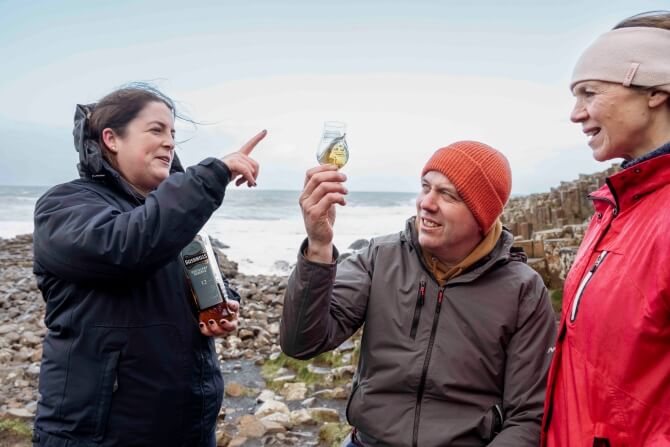How learning from others can help develop a great experience
Contents
- A Vital Partnership: How Arts, Culture and Heritage can work with tourism
- How to develop a sustainable Arts, Cultural or Heritage tourism business
- How Arts, Culture, and Heritage can Embrace a Giant Spirit
- How Arts, Culture and Heritage can boost our Giant Stories
- How to use storytelling skills to bring heritage to life
- How to present Arts, Culture, and Heritage to diverse visitors
- How to communicate with international visitors
- How learning from others can help develop a great experience
- Arts, Culture and Heritage in Tourism Toolkit
Contents
- A Vital Partnership: How Arts, Culture and Heritage can work with tourism
- How to develop a sustainable Arts, Cultural or Heritage tourism business
- How Arts, Culture, and Heritage can Embrace a Giant Spirit
- How Arts, Culture and Heritage can boost our Giant Stories
- How to use storytelling skills to bring heritage to life
- How to present Arts, Culture, and Heritage to diverse visitors
- How to communicate with international visitors
- How learning from others can help develop a great experience
- Arts, Culture and Heritage in Tourism Toolkit
How learning from others can help develop a great experience
Tourism businesses need to be flexible and adaptable. They must be ready to meet the changing needs of consumers and respond to new challenges and opportunities locally. Learning from other experiences can help to identify key trends and local shifts quickly. Collaboration and networking are essential. Tourism is a huge industry made up of a network of many medium, small and micro businesses. It works best when all pull together.

Learning from consumers
Great tourism businesses change and evolve to meet their consumers’ interests and needs. They have a strong learning culture and are always hungry for feedback from their customers, knowing that this is the backbone of success.
Collecting data from visitors can be done formally through professional evaluators using surveys, focus groups and other techniques. Large institutions will do this. For smaller operators a strong focus on watching and listening to visitors and asking all staff to do the same can give similar insights.
However you collect the information, either on the day or as a follow up communication, the most important thing is that you use it to drive improvement and increase visitor satisfaction.
Learning from industry research
Tourism Ireland and Tourism Northern Ireland collect and publish data about visitors to Northern Ireland and what motivates them to travel. This is vital information for understanding and providing for the main target markets.
Learning about your local network
Arts, culture and heritage businesses who want to succeed in tourism need to be part of their local tourism network.
Visitors from outside your area will see your offering as part of a bigger picture that includes where they eat and sleep, how they travel and what else they do. You need to understand how you fit into their holiday, so familiarise yourself with your tourism context. The Tourism Team in your Council can point you in the right direction.
Learning from competitors
One of the best ways to understand the requirements of moving into the tourism industry is to look closely at what other people are doing and apply lessons from them to your own business.
Identify your competitors and embrace their experience. Look at their visitor offer, their promotion, their website and their on-site experience and follow up. Read their reviews on TripAdvisor. Note stand-out elements, originality, location and transport, information content, accessibility, sustainability, opening times and price. Identify what impresses you and how you could build something similar into what you do. Think about what they might improve and check you do not have the same weaknesses. Finally, identify what you offer that they cannot.
Learning from international benchmarking
Carry out the above exercise for international businesses who offer something like you do. Will overseas visitors find the standards they expect when they come to you?
Tourism is highly competitive, not just in Northern Ireland but internationally. Standards are immensely high, and we must compete for visitors with many other parts of Europe and the world. Our tourism businesses need an international perspective as well as a local one.
Learning from collaborating
Building partnerships and collaborations with other local businesses can be a great way to diversify and enhance your visitor offer. Working with experienced local providers will also teach you a lot about the reality of working in tourism in your area.
Businesses working together help to develop a cohesive and distinctive sense of place for your area. It helps it become a destination that visitors seek out and where they stay longer, which in turn can boost the benefits of several tourism businesses in your area.
National Trust and Old Bushmills Distillery - Whiskey on the Rocks

Whiskey on the Rocks, a highly successful experience on the Giant’s Causeway, is a collaboration between the National Trust and Old Bushmills Distillery. Combining Northern Ireland’s only World Heritage Site and the world’s oldest distillery creates an offer that is unique, authentic, representative of Northern Ireland and highly appealing to visitors.
This two-hour guided experience gives visitors a deeper understanding of these places and an opportunity to really engage with some of the people who help make them so special.